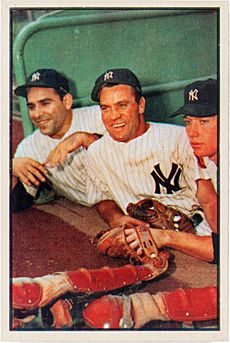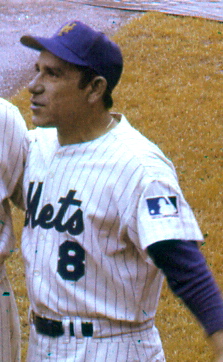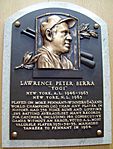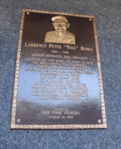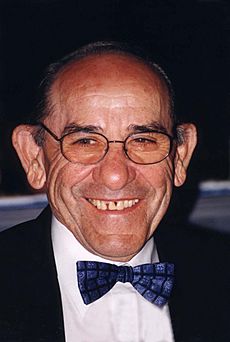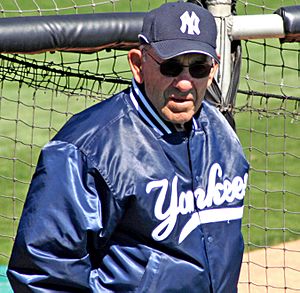Yogi Berra facts for kids
Quick facts for kids Yogi Berra |
|||||||||||||||||||
|---|---|---|---|---|---|---|---|---|---|---|---|---|---|---|---|---|---|---|---|
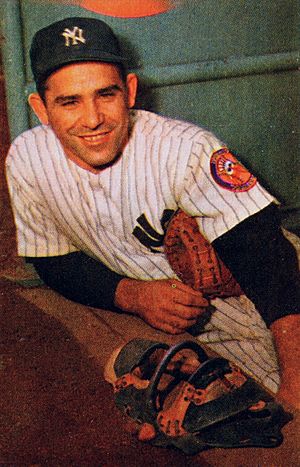
Berra with the New York Yankees in 1953
|
|||||||||||||||||||
| Catcher / Manager | |||||||||||||||||||
| Born: May 12, 1925 St. Louis, Missouri, U.S. |
|||||||||||||||||||
| Died: September 22, 2015 (aged 90) West Caldwell, New Jersey, U.S. |
|||||||||||||||||||
|
|||||||||||||||||||
| debut | |||||||||||||||||||
| September 22, 1946, for the New York Yankees | |||||||||||||||||||
| Last appearance | |||||||||||||||||||
| May 9, 1965, for the New York Mets | |||||||||||||||||||
| MLB statistics | |||||||||||||||||||
| Batting average | .285 | ||||||||||||||||||
| Hits | 2,150 | ||||||||||||||||||
| Home runs | 358 | ||||||||||||||||||
| Runs batted in | 1,430 | ||||||||||||||||||
| Managerial record | 484–444 | ||||||||||||||||||
| Winning % | .522 | ||||||||||||||||||
| Teams | |||||||||||||||||||
As player
As manager
As coach
|
|||||||||||||||||||
| Career highlights and awards | |||||||||||||||||||
|
|||||||||||||||||||
| Induction | 1972 | ||||||||||||||||||
| Vote | 85.61% (second ballot) | ||||||||||||||||||
|
|||||||||||||||||||
Lawrence Peter "Yogi" Berra (May 12, 1925 – September 22, 2015) was an American professional baseball player. He was a famous catcher, and later became a manager and coach. Yogi played 19 seasons in Major League Baseball (MLB). He spent almost all of his playing career (1946–1963) with the New York Yankees.
Yogi Berra was an 18-time All-Star. He won 10 World Series championships as a player. This is more than any other player in MLB history! He had a batting average of .285. He also hit 358 home runs and had 1,430 runs batted in. He is one of only six players to win the American League Most Valuable Player Award three times. Many people think he was one of the best catchers ever. He was chosen for the Baseball Hall of Fame in 1972.
Berra grew up in St. Louis. He joined the Yankees in 1943. Then he served in the United States Navy during World War II. He was a gunner's mate during the Normandy landings and earned a Purple Heart. He started playing in the major leagues at age 21 in 1946. He was a key player for the Yankees during their many championship wins from 1949 to 1962.
Yogi was a power hitter and a great defensive catcher. He was shorter than most players at 5 feet 7 inches [1.70 m] tall. After playing 18 seasons with the Yankees, he retired in 1963. He managed the Yankees for one year. Then he joined the New York Mets in 1965 as a coach and briefly played again. He stayed with the Mets for ten years, managing them for four. He returned to the Yankees in 1976 as a coach and later managed them for two seasons. He also coached for the Houston Astros. He is one of only nine managers to lead teams in both the American and National League to the World Series.
Yogi Berra was part of every one of the 13 World Series that New York baseball teams won from 1947 to 1981. He played or coached in 21 World Series in total, winning 13 of them. He famously caught Don Larsen's perfect game in the 1956 World Series. This was a very rare and special game where no opposing player reached base. He also holds the record for the most shutouts caught, with 173.
The Yankees retired his uniform number 8 in 1972. Bill Dickey, another great catcher, also had number 8 retired. The team honored Yogi with a plaque in Monument Park in 1988. Fans voted him onto the Major League Baseball All-Century Team in 1999. For the rest of his life, he was involved with the Yogi Berra Museum and Learning Center. He opened this museum in 1998 at Montclair State University. Yogi was known for his funny and wise sayings, called "Yogi-isms," like "It ain't over 'til it's over." He once joked, "I really didn't say everything I said."
Contents
Early Life and Baseball Dreams
Yogi Berra was born Lawrence Peter Berra on May 12, 1925. He grew up in a neighborhood in St. Louis called The Hill. Many Italian families lived there. His parents, Pietro and Paolina Berra, were immigrants from Italy. Pietro came from a town near Milan.
Yogi's parents first called him "Lawdie." This was because his mother had trouble saying "Lawrence" or "Larry." He lived across the street from his childhood friend, Joe Garagiola Sr., who also became a famous baseball player. Yogi was Catholic and went to St. Mary's High School with Joe. Yogi Berra is also in the St. Louis Walk of Fame.
He started playing baseball in local leagues. He learned to play many positions, including outfield and infield. He also learned the important skills of a catcher. His friend Jack Maguire gave him the nickname "Yogi." Jack thought Yogi looked like a yogi from India when he sat with his arms and legs crossed, waiting to bat or looking sad after a loss.
Yogi's Professional Baseball Journey
Starting in the Minor Leagues
In 1942, the St. Louis Cardinals chose Yogi's friend, Joe Garagiola Sr., over him. The Cardinals' president, Branch Rickey, actually liked Berra a lot. He planned to sign Yogi later for the Brooklyn Dodgers. But the Yankees signed Berra first for $500. This was the same amount the Cardinals offered Garagiola.
Serving in World War II
During World War II, Yogi Berra joined the United States Navy. He was a gunner's mate on a ship called USS Bayfield. He took part in the Normandy landings. He was a Second Class Seaman and part of a six-man crew on a rocket boat. They fired machine guns and launched rockets at German defenses on Omaha Beach. He was shot in the left hand during another operation, which earned him a Purple Heart.
After his military service, Berra played minor-league baseball for the Newark Bears. Even though he was short, he surprised his manager with his great talent. He learned a lot from Bill Dickey, a Hall of Famer. Yogi later said, "I owe everything I did in baseball to Bill Dickey." Yogi even took Bill Dickey's uniform number, 8.
Becoming a Major League Star
Yogi Berra joined the Yankees and played his first game on September 22, 1946. He played in 7 games that year and 83 games in 1947. For the next 14 years, he played in over 100 games each season. Yogi played in 14 World Series, winning 10 of them. Both of these are MLB records!
Because he played during the Yankees' best years, he set World Series records. He played in the most games (75), had the most at bats (259), hits (71), and doubles (10). He also caught the most games (63) and had the most catcher putouts (457). In Game 3 of the 1947 World Series, Yogi hit the first pinch-hit home run in World Series history.
Yogi was an All-Star for 15 seasons. He was chosen for 18 All-Star Games. (MLB had two All-Star Games in some years). He won the American League (AL) MVP award three times: in 1951, 1954, and 1955. From 1950 to 1957, he was always among the top four players for MVP votes. He received MVP votes for 15 seasons in a row. From 1949 to 1955, even with stars like Mickey Mantle and Joe DiMaggio on the team, Yogi led the Yankees in RBI for seven years straight.
One of his most famous moments was catching Don Larsen's perfect game in the 1956 World Series. This was the first of only three no-hitters ever thrown in MLB postseason play. The picture of Yogi jumping into Larsen's arms after the last out is one of baseball's most famous images.
Yogi's Playing Style
Yogi Berra was amazing at hitting pitches, even those outside the strike zone. He could hit low pitches for home runs and high pitches for line drives. Pitcher Early Wynn said, "Berra moves right with you." Five times, Yogi hit more home runs than he had strikeouts in a season. In 1950, he only struck out 12 times in 597 at-bats! This made him a feared "clutch hitter." Rival manager Paul Richards called him "the toughest man in the league in the last three innings."
As a catcher, Yogi was outstanding. He was quick, moved well, and was great at working with pitchers. He led American League catchers many times in games caught, double plays, and putouts. He was one of only four catchers to play a season without making any errors, doing so in 88 games in 1958. He was also the first catcher to keep one finger outside his glove. Many other catchers copied this style.
At age 37 in 1962, Yogi showed how strong he was by catching an entire 22-inning game. This game lasted seven hours! Casey Stengel, his manager, once said, "I never play a game without my man." Later in his career, Yogi also became a good defensive outfielder.
Manager of the Yankees and Mets
After the 1963 season, Yogi retired as a player and became the Yankees' manager. In August 1964, a funny event happened on the team bus. After a loss, player Phil Linz was playing his harmonica. Yogi told him to stop. Linz couldn't hear him, so Mickey Mantle joked, "He said to play it louder." When Linz did, an angry Yogi slapped the harmonica out of his hands!
The Yankees made it to the World Series that year, but they lost to the St. Louis Cardinals. Yogi was fired after the season.
Yogi then joined the New York Mets as a coach. He even played in four games as a catcher in 1965. His last game was just three days before his 40th birthday. He stayed with the Mets as a coach and became their manager in 1972.
In 1973, the Mets had many injuries and were in last place. A reporter asked Yogi if the season was over. He famously replied, "It ain't over 'til it's over." The Mets' key players returned, and they made a late comeback. They won their division and then beat the strong Cincinnati Reds in the playoffs. Yogi's Mets went to the 1973 World Series, but they lost to the Oakland Athletics in seven close games.
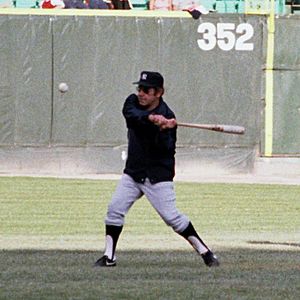
Yogi was fired as Mets manager in 1975. In 1976, he rejoined the Yankees as a coach. The team won three straight AL titles and two World Series (1977, 1978). Yogi's reputation as a "lucky charm" grew even stronger. Casey Stengel once said of him, "He'd fall in a sewer and come up with a gold watch."
Yogi became the Yankees manager again in 1984. He agreed to stay for 1985, but the team owner, George Steinbrenner, fired him after only 16 games. This made Yogi very upset, and he didn't return to Yankee Stadium for almost 15 years.
He then coached for the Houston Astros from 1985 to 1989. He helped them reach the playoffs in 1986. Yogi retired from coaching after the 1989 season. His total record as a manager was 484 wins and 444 losses.
In 1999, George Steinbrenner went to Yogi's home to apologize. Yogi then ended his long break from the Yankees. He returned to spring training to help coach catchers like Jorge Posada.
Managerial Record
Here is a summary of Yogi Berra's record as a manager:
| Team | Year | Regular season | Postseason | |||||||
|---|---|---|---|---|---|---|---|---|---|---|
| Games | Won | Lost | Win % | Finish | Won | Lost | Win % | Result | ||
| NYY | 1964 | 162 | 99 | 63 | .611 | 1st in AL | 3 | 4 | .429 | Lost World Series (STL) |
| NYM | 1972 | 156 | 83 | 73 | .532 | 3rd in NL East | – | – | – | – |
| NYM | 1973 | 161 | 82 | 79 | .509 | 1st in NL East | 6 | 6 | .500 | Lost World Series (OAK) |
| NYM | 1974 | 162 | 71 | 91 | .438 | 5th in NL East | – | – | – | – |
| NYM | 1975 | 109 | 56 | 53 | .514 | fired | – | – | – | – |
| NYM total | 588 | 292 | 296 | .497 | 6 | 6 | .500 | |||
| NYY | 1984 | 162 | 87 | 75 | .537 | 3rd in AL East | – | – | – | – |
| NYY | 1985 | 16 | 6 | 10 | .375 | fired | – | – | – | – |
| NYY total | 340 | 192 | 148 | .565 | 3 | 4 | .429 | |||
| Total | 928 | 484 | 444 | .522 | 9 | 10 | .474 | |||
Honors and Awards
 |
|
| Yogi Berra's number 8 was retired by the New York Yankees in 1972. |
Military Honors
During World War II, Yogi Berra was a machine gunner in the Navy. He took part in the D-Day invasion. He earned a Purple Heart for being wounded. He also received a Distinguished Unit Citation and two battle stars.
Baseball Achievements
In 1972, Yogi Berra was elected to the Baseball Hall of Fame. The Yankees retired his number 8 in 1972. This honored both Yogi and Bill Dickey, another great Yankees catcher.
On August 22, 1988, Yogi and Bill Dickey received plaques in Monument Park at Yankee Stadium. Yogi's plaque calls him "A legendary Yankee." It also includes his famous quote, "It ain't over till it's over."
In 1996, Yogi received an honorary degree from Montclair State University. The university also named its baseball stadium Yogi Berra Stadium after him. The stadium opened in 1998.
In 1998, The Sporting News listed Yogi as number 40 on its list of the 100 Greatest Baseball Players. Fans also voted him onto the Major League Baseball All-Century Team. At the 2008 All-Star Game at Yankee Stadium, Yogi received the loudest cheer from the crowd.
On July 18, 1999, the Yankees held "Yogi Berra Day" at Yankee Stadium. Don Larsen threw the ceremonial first pitch to Yogi. This celebrated their famous perfect game from the 1956 World Series. This day also marked Yogi's return to the stadium. He had not been there for 14 years because of his disagreement with owner George Steinbrenner. On that day, Yankees pitcher David Cone threw a perfect game against the Montreal Expos. This was only the 16th perfect game in Major League history!
In 2005, Yogi received the Golden Plate Award. In 2008, he was inducted into the New Jersey Hall of Fame. He also received the Bob Feller Act of Valor Award in 2013.
Yogi Berra Museum and Learning Center
In 1998, the Yogi Berra Museum and Learning Center and Yogi Berra Stadium opened. They are on the campus of Montclair State University in Upper Montclair, New Jersey. The museum has many items from Yogi's career. These include the glove he used to catch the only perfect game in World Series history. It also has several of his championship rings.
Yogi was very involved with the museum. He often visited for events. He wanted to teach children important values like sportsmanship and dedication. In 2014, some of his World Series rings and other items were stolen from the museum during a break-in.
Presidential Medal of Freedom
On November 24, 2015, Yogi Berra was given the Presidential Medal of Freedom. This is a very high honor in the United States. President Barack Obama gave the award to Yogi's family after Yogi had passed away. President Obama praised Yogi's military service and baseball career. He even used one of Yogi's famous "Yogi-isms," saying, "One thing we know for sure: If you can't imitate him, don't copy him."
USPS Stamp
On July 1, 2021, the United States Postal Service released a special Yogi Berra stamp. Yogi is only the 30th baseball player to be on a stamp. He is also the first player since Lou Gehrig in 1989 to have a stamp all to himself.
Personal Life
Yogi Berra married Carmen Short on January 26, 1949. They had three sons. They lived in Montclair, New Jersey, for a long time. Later, they moved to an assisted living facility in West Caldwell.
Yogi's sons also played professional sports. Dale Berra played shortstop in baseball. Tim Berra played professional football. Larry Berra played minor league baseball. Carmen Berra passed away on March 6, 2014, at age 85. They had just celebrated their 65th wedding anniversary. After Carmen's death, their house was listed for sale at $888,000, a nod to Yogi's uniform number 8.
Death
Yogi Berra passed away peacefully in his sleep on September 22, 2015. He was 90 years old.
The Yankees added a number "8" patch to their uniforms to honor Yogi. The Empire State Building in New York City was lit up in blue and white "pinstripes" like the Yankees' uniform. New York City lowered all flags to half-staff. Many baseball teams held a moment of silence before their games. The Yogi Berra Museum held a special tribute on October 4.
Yogi's funeral was held on September 29. His ashes were buried next to his wife Carmen in East Hanover, New Jersey. His longtime friend, Joe Garagiola Sr., passed away six months later. Yogi's Yankee teammate Don Larsen, who pitched the perfect game Yogi caught, passed away in 2020.
"Yogi-isms"
Yogi Berra was famous for his funny and wise sayings. These are known as "Yogi-isms." They often sounded like they were repeating themselves or were a bit confusing, but they usually had a deeper meaning.
Famous Examples
- "It ain't over 'til it's over." He said this when the Mets were far behind in 1973. They ended up winning their division!
- "It's déjà vu all over again." Yogi said this when Mickey Mantle and Roger Maris kept hitting home runs one after another.
- "You can observe a lot by watching."
- When giving directions to his friend Joe Garagiola Sr. about his house, which had two ways to get there: "When you come to a fork in the road, take it."
- About a restaurant that was no longer popular: "Nobody goes there anymore. It's too crowded."
- At a special "Yogi Berra Day" in St. Louis: "Thank you for making this day necessary."
- "Always go to other people's funerals; otherwise they won't go to yours."
- About low attendance at games: "If people don't want to come to the ballpark, how the hell are you gonna stop them?"
- "A nickel ain't worth a dime anymore."
- "If you can't imitate him, don't copy him."
- "Ninety percent of the game is half mental." (Sometimes said as: "Baseball is 90 percent mental. The other half is physical.")
- "I really didn't say everything I said."
Yogi is sometimes wrongly given credit for the saying "It ain't over till the fat lady sings." But he didn't say that one. When asked about it, he joked, "That’s one of the things that I said that I never said."
Images for kids
See also
 In Spanish: Yogi Berra para niños
In Spanish: Yogi Berra para niños
 | Selma Burke |
 | Pauline Powell Burns |
 | Frederick J. Brown |
 | Robert Blackburn |


